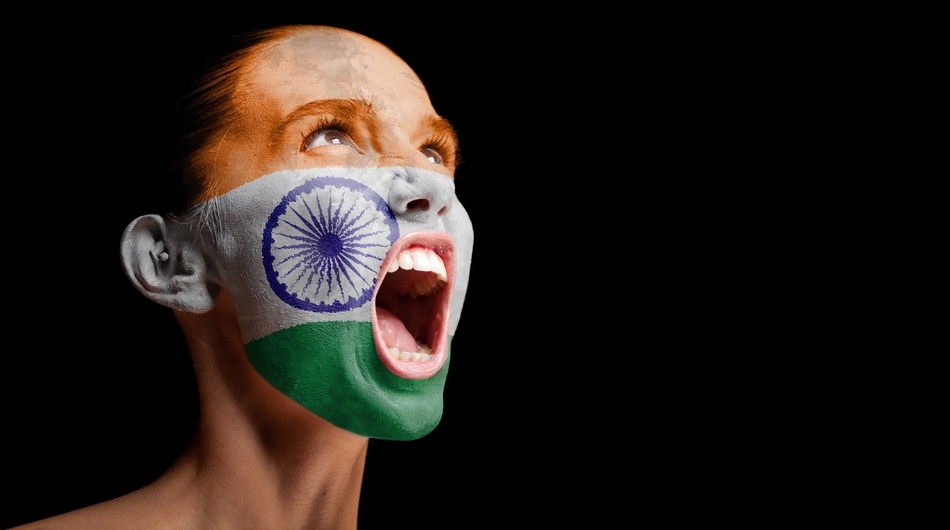
Photo credit: tpabma / 123RF.
Yesterday was India’s Republic Day. We pride ourselves on being a modern, liberal democracy. But the truth is that gender inequality in India is as bad as in some of the most repressive regions of the world.
It stares us in the face every day as we chat away on Facebook, but we’re blissfully oblivious of it – or we don’t care. More than three-quarters of Facebook users in India are male. If the internet and social media are liberators of the new age, clearly that’s yet to happen in India for women.

Most Facebook users in India are in the 18-24 age group, and boys outnumber girls three to one. Source: We Are Social and Hootsuite.

Less than a quarter of India’s 191 million Facebook users are female. Source: We Are Social and Hootsuite.
And it’s not even as though we’re in the early days of the internet and social media. The country has 462 million internet users, next only to China, and 191 million Facebook users, next only to the United States. Did you ever stop to think that only 24 percent of those 191 million on Facebook are female? Globally, Facebook’s ratio is 56 percent male and 44 percent female, according to new data compiled by social media marketing agencies We Are Social and Hootsuite.

Globally, 44 percent of Facebook users are female, compared to India’s 24 percent. Source: We Are Social and Hootsuite.
That a large number of women in India are housewives, with no professional careers, cannot entirely explain this massive skew. The bulk of Facebook users are in the college-going 18-24 age group.
So it suggests something more pernicious: fewer women going on to higher studies – especially in engineering colleges – and easier access to smartphones for boys. Prudish families in India are known to deny smartphones to girls in the family because they don’t want their daughters to be chatting with boys. Last year, we even had the shameful acts of town councils in the states of Gujarat and Uttar Pradesh in western and northern India banning the use of mobile phones by single women.
But it’s not just in rural areas that you find discrimination – sexism is pervasive in urban India, too, even if it may not be as overt as in villages. It starts early in school, where girls are encouraged to opt for soft skills, continues in college, where young women go for humanities even though they outscore boys in math, and finally it is manifested in the shiny world of startup hubs.
See: Are you sexist and you don’t know it? Ask yourself that if you’re in tech
Boys’ club
An industry report shows that women comprise less than 30 percent of the nation’s tech workforce. Less than 10 percent of 1,010 startups that came up in India last year were founded by women. At a recent Tech in Asia-BHive SheTalks meetup in Bangalore, founders spoke of different shades of sexism they encounter in this male-dominated space.
See: The real deal about women pitching in a man’s world


So it’s not really surprising to see this gender inequality reflected in internet and social media use as well. Facebook is the most popular social media platform in India, alongside YouTube. The capital, New Delhi, is among the top 10 cities in the world in Facebook usage.
“Globally, nearly four billion people lack internet access, most of them women,” points out a Facebook spokesperson.
The worst gender balance on Facebook is in countries like Yemen, Afghanistan, and Sudan, but India comes close. The best ratios are seen across northern and eastern Europe, like in Estonia where women actually outnumber men on Facebook.
See: 9 women entrepreneurs who are the change they want to see in India

Less than a quarter of India’s women being on Facebook also has implications for big brands. If a business wants to market to women on the web, they’re not likely to find them on Facebook. That’s bad news for Zuckerberg’s social network as it makes nearly all of its revenue – 97.2 percent – from advertising.
“We are committed to bringing women online through various initiatives as the internet gives women a voice and allows their voices to be heard,” said a Facebook spokesperson when asked about the gender imbalance and its effect on Facebook’s advertising business. “We require a multi-stakeholder effort to correct the gap.”
See: Inside Alibaba-owned UCWeb’s plan to outwit Google and Facebook in Asia
(This is an opinion piece.)
This post Facebook has a big ‘women problem’ in India appeared first on Tech in Asia.